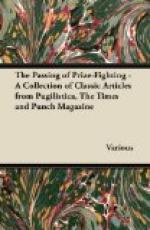The rest of the afternoon was chiefly occupied by a further combat over the merits of Lord FISHER. Although, as Dr. MACNAMARA subsequently remarked, “this is not the time for fighting battles along the Whitehall front,” I am afraid the House thoroughly enjoyed Sir HEDWORTH MEUX’S discursive account of his relations with the late FIRST SEA LORD, who really seems to be quite a forgiving person. At least it is not everybody who, after being greeted at a garden-party with “Come here, you wicked old sinner,” would afterwards invite his accuser to lunch at the Ritz.
In the first statement of policy made by Mr. LLOYD GEORGE after his appointment as Prime Minister he said that the primary step towards a settlement of an age-long Irish trouble would be the removal of the suspicion of Irishmen by Irishmen. Mr. DILLON’S notion of contributing to that desirable end is to accuse Sir BRYAN MAHON, who has had to deport certain recidivist Sinn Feiners, of being the tool of a Dublin Castle gang. Not, of course, that Mr. DILLON is in sympathy with Sinn Feiners; on the contrary he dislikes them so much that he would like to keep St. George’s Channel between them and himself. But by his own speeches he has hypnotized himself into the belief that everything done by the British Government in Ireland must have a corrupt motive. His colleague from West Belfast is not much wiser, to judge by the tone of his speech to-night; and I think Mr. DUKE, who is doing his best to reconcile the irreconcilable, must have been tempted to adapt one of MR. DILLON’S phrases and to say that Ireland was between the DEVLIN and the deep sea.
Tuesday, February 27.—The capture of Kut has had an exhilarating effect upon Lord CREWE. Not long ago he was warning us against excessive jubilation over the British advance in that region. Now he justified his title by coming out as a regular Chanticleer, and invited Lord CURZON to tell the assembled Peers that we might be confident of regaining predominance in the whole of Mesopotamia.
[Illustration: LORD BUCKMASTER’S DREAM OF A BRIGHTENED HOUSE OF LORDS.]
In these times the Lords can refuse nothing to the Ladies. In moving the second reading of a Bill to enable women to become solicitors Lord BUCKMASTER may have approached his subject in the spirit of a cautious knight-errant, as Lord SUMNER said, but he carried his argument. He owed something, perhaps, to the unintentional assistance of his opponents. Lord BUCKMASTER had incidentally mentioned that a woman once sat on the Woolsack, and there administered such very odd law that the City of London rose in mutiny. This shocked the historical sense of Lord HALSBURY, who hastened to point out that the lady in question had left the Woolsack for a reason entirely creditable to her sex, namely to become the mother of one of our greatest Kings. Then Lord FINLAY, who now occupies the seat alleged to have been filled by ELEANOR of Provence, endeavoured to frighten their Lordships by the thin end of the wedge argument. If women were admitted solicitors they would next want to practise at the Bar, and even become Judges. But the Peers refused to be intimidated, and gave the Bill a second reading.




